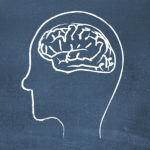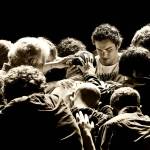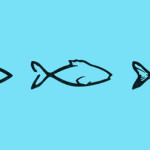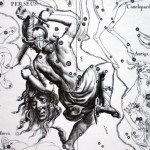How Does Theology Protect Science?
by Dr. Stacy Trasancos
Filed under Christianity and Science
The other day I made the statement, “Science is a sphere unto itself with its own methods, but it falls under the umbrella of theology.” One commenter asked how theology pertains to the sphere of science: “I don’t see how the two relate nor how science, most notably modern science including the laws of nature, physics and chemistry, could fall under the umbrella of knowledge of things divine?”
Good question, and I promised her an answer. I would not have been able to answer that question before I studied theology. I would not have been able to answer it as a scientist. Then again, I would not have made the initial statement back then either. I forget how incredibly foreign this concept would have been to me, and this is one area I hope to devote more writing towards clarifying. I spent a great deal of time studying science, but not fully understanding my drive to seek the truth about the natural world. Studying the history of the Catholic Church and the University was like flipping on a light switch. I could finally see how theology and science fit together—united in a hierarchy.
Some Historical Facts About the University
(Gathered and paraphrased from the links to The Catholic Encyclopedia, New York: Robert Appleton Company. Digitized by New Advent.)
- Universities began in the Middle Ages (fall of the Roman Empire to mid-15th century).
- They were started by the Catholic Church, united throughout Christendom, often in cooperation with civil authority.
- The dialectical method (Aristotelian systematic logic) was applied to theological questions and developed into Scholasticism.
- All sorts of questions were examined with utmost subtlety and logical rigor.
- Doctrine and theology were cast into this systematic form most recognizable in the works of St. Thomas Aquinas (i.e. Summa Theologiae).
- A school in Bologna became the first university (1088 A.D.), the new movement affected the teaching of theology, philosophy, civil and canon law.
- Bologna was famous as a school of arts and legal science; it became a center of systematic study and prestige.
- This consortium magistorum included professors of theology, law, medicine, and arts (philosophy).
- Teachers of the same subject formed smaller groups, “faculties” designating a discipline or branch of knowledge.
- The faculties were organized to deal with the sciences and the work of teaching.
- Science, back then, did not refer to the restricted meaning used today, but in the general sense of Aristotle and St. Aquinas.
- Aristotle defined science as sure and evident knowledge obtained from demonstrations.
- St. Thomas defined science as the knowledge of things from their causes.
- Thus, in the first universities, science comprised the entire curriculum of studies.
- Specialized research became the aim of university work.
- As a result, the departments of science multiplied.
- The faculty of philosophy included everything that did not belong to theology, medicine, or law.
- This is where the terms Bachelor of Arts, Master of Arts, and Doctor of Philosophy came from, which are still in use today.
- The spirit was one of co-operation. The unity of faith and of hierarchical jurisdiction held the unity in the university (universitas) throughout Cristendom.
Catholic means "universal," the university represented teacher and student united, disciplines united, all in a search for truth. The science of faith is called theology. If science is knowledge of things from their causes, per St. Thomas, then theology is the highest science since it is knowledge about the ultimate cause of all things, with God as its object and revelation as its principle.
Hopefully this brief history sheds light on the opening statement, “Science is a sphere unto itself with its own methods, but it falls under the umbrella of theology.” Why is this important to understand? Consider the psychological mindset of the Christian West, compared to any other mindset past or present.
The Christian Mindset
Theology, the study of doctrine derived from Divine Revelation, informed man that he was created by God, in the image and likeness of God with an intellect and a will. He was created to learn, to seek the truth, and he was able to recognize truth if it was demonstrated with certainty. He also knew from Divine Revelation that the universe was created by God with order, he expected to be able to study that order and discover it. He also knew from Divine Revelation that the universe had an absolute beginning and everything in it was moving toward an absolute end. Thus, he believed that matter and motion could be observed and measured, and that his culture and academic ability could progress. He also knew from Divine Revelation that he was made with a free will to choose to good or evil, and he knew that choosing evil led to a bad end and choosing good led to a good end. The Christian pursued virtue throughout his life, or at least he knew he ought to do so. He knew he was a social animal, a rational animal, eternally responsible for his choices.
It was under this mental landscape that universities grew in the Middle Ages, the mindset that man was made for truth and virtue. It came from theology and theology guided the other disciplines, protecting them from falsehood or vice. Consider what would happen to academic institutions if the search for truth no longer operated under the Christian mindset. What kind of strange laws would scientists conjure up in world without a beginning and end? How would scientists ever prove anything if man could not recognize truth? Science would just be some swirling quagmire of opinion.
Further, would the scientist operate with humility and honesty in facing up to the truth, wherever it led, if he had no reason to pursue virtue? Or would he artfully leave humility undefined, calling himself a humble scientist for the sake of his image? Would he fail to even recognize anything beyond him which ought to humble him? Would he deny the necessity of honesty? Would he trade sincere virtue, devoid of objective reference points, into whatever posture a hidden agenda demanded? Would not that greedy trade-off elevate the scientist to a god of his own? Is not elevating one’s self to omniscience the highest form of hubris? Is not it the worst perversion of science—to turn it into omniscience?1
It is incongruous to assume that man, lacking any belief in an ordered universe with a beginning and an end, or an intellect that could discover that order while held to virtuous standards, would have ever organized such united, massive, and excellent institutions directed toward a greater good beyond himself. Where are the atheist universities with institutional continuity throughout a rich history aiding the progress of humanity? That alone highlights the importance of theology and how it provides a protective umbrella to all scientific study, even if the word “science” today is only recognized in a truncated form of its fuller meaning. Any search for truth requires humility, honesty, and many other virtues if the search for truth is genuine—for the search, even for a physicist or chemist in a laboratory, is still a search within the universe that God created.
Related Posts
Notes:
- From Questions on Science and Religion, Father Stanley L. Jaki, Real View Books, p. 50-51.
Note: Our goal is to cultivate serious and respectful dialogue. While it's OK to disagree—even encouraged!—any snarky, offensive, or off-topic comments will be deleted. Before commenting please read the Commenting Rules and Tips. If you're having trouble commenting, read the Commenting Instructions.













